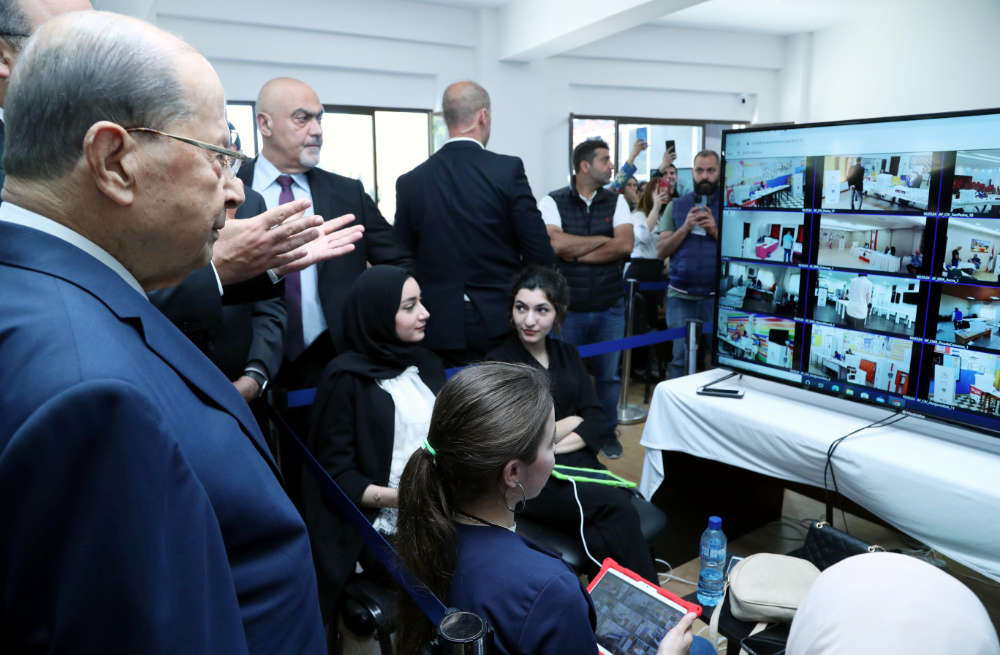BEIRUT: The second round of Lebanese expat voting took place on Sunday, with overseas voters from 48 countries heading to the polls as the country hopes for a break in the political impasse.
Given the different time zones, it was difficult to monitor votes in each continent. However, young expats who recently left Lebanon expressed great enthusiasm in voting for the forces of change over the ruling parties.
A total of 194,348 Lebanese expats were registered to vote on Sunday, but turnout trickled in relatively weakly, but the enthusiasm many had shown in the first round of expat voting on Friday ensured optimism remained high.
Turnout is low compared to the last national elections in 2018. The weak voting rate has even been reflected in some countries where voters have explicitly expressed affiliation with Hezbollah and the Amal Movement.

President Michel Aoun visits the Ministry of Foreign Affairs. (Supplied)
Expats living in countries that have a Sunday weekend voted on Sunday, while those living in the 10 Arab and Muslim countries that have a Friday weekend were the first to vote on Friday. The third and final stage will take place on May 15, with the Lebanese voting at home.
At midnight on Saturday, Beirut time, the polls opened in Australia, where the number of registered voters was 20,602. The polling process in the UAE kicked off at 6:00 a.m., with 25,066 registered voters living in Dubai and Abu Dhabi. Polls then opened in European and African countries. As soon as the polls closed in Australia at 3:00 p.m. Beirut time, the polls opened in Canada, the US, Brazil and Venezuela.
Speaking from the operations room designated to monitor the elections via the Internet, which is linked to all polling stations around the world, Foreign Minister Abdullah Bou Habib announced that the turnout in Australia had reached 54 percent an hour before the polls closed.
The queues at the Lebanese General Consulate in Dubai stretched for over 1 km, as voters waited for hours under the scorching sun to cast their votes, while the turnout in Abu Dhabi hit 65.2 percent at 3 p.m. Beirut time.
In 2018, expat turnout in the UAE exceeded 66 percent.
The Lebanese Association for Democratic Elections reported some violations, such as voters taking selfies or pictures of the lists they were voting for behind the isolators. It added that isolators in some polling stations in Australia were exposed.
Delegates for candidates observed the voting process in different countries. In African countries and Germany, supporters of Hezbollah and the Amal Movement flocked to polling stations to campaign for their parties. Meanwhile, voters in Australia complained about different polling stations being assigned to several members of the same family, forcing them to take relatively long trips to cast their votes.
In Turkey, 999 Lebanese expats registered to vote overseas, with 323 in Russia, 696 in Romania, 528 in Greece and 840 in Cyprus.
A total of 27,813 voters were registered in France, 233 in Ireland, and 6,535 in Britain.
In Germany, 16,171 voters were registered, 2,601 in Switzerland, 2,128 in Italy, 1,226 in Spain, 965 in the Netherlands, 706 in Denmark, 282 in Austria, 215 in Poland, 200 in Luxembourg, and 221 in Hungary.
In Zambia, 410 expats were registered, 405 in South Africa, 2,580 in Nigeria, 848 in Gabon, 653 in DR Congo, 518 in Benin, 332 in Angola, 228 in Cameroon, 248 voters in Morocco, 6,070 in Côte d'Ivoire, 532 in Guinea, 1,012 in Ghana, 724 in Sierra Leone, 707 in Senegal, 458 in Togo, 376 in Liberia, 317 in Mali and 293 in Burkina Faso.
Meanwhile, President Michel Aoun visited the operations room in Beirut where he was briefed on how elections abroad are being monitored. Speaking to the press, Aoun hoped that “the elections will end smoothly, without problems or objections and for things to improve in the upcoming elections so that they would be easier and at a lower cost than today, by using a code to vote and not having to fly in ballot boxes.”
Many foreign diplomats also visited the operations room to inspect the electoral process. The EU’s Election Observation Mission’s deputy, Jarek Domanski, said: “The mission’s 16 teams are monitoring the progress of the electoral process, and they are distributed over 13 European countries.”
Domanski noted: “The teams that will undertake the same task next Sunday will include about 170 observers. The mission team will monitor the numbers of ballot boxes coming from abroad in order to match them when the counting process begins on May 15.”














